While stress is a natural component of our lives, prompting us to evolve and respond to challenges, its growing ubiquity is concerning. As we entered 2023, over a quarter of individuals, or 26%, anticipated facing heightened stress, marking a significant jump from the previous year’s 20%.
Such pervasive stress, when left unchecked, can wreak havoc on our mental and physical states. Recognizing the multifaceted nature of stress is pivotal to curbing its detrimental effects. In this blog post, we will demystify the various stress categories and offer tangible strategies for managing stress.
General Tips for All Types of Stress
Before diving deeper into the nuances of each stress variation, it’s essential to grasp a central premise: every kind of stress has the potential to cultivate anxiety. Recognizing this, a primary tool in our arsenal is cognitive behavioral therapy (CBT).
As an evidence-based approach, CBT for anxiety tackles stress-induced states of mind by helping individuals reframe debilitating thought patterns. Additionally, a restful and consistent sleep routine is paramount for mental rejuvenation. Introducing mindfulness practices into our daily routines can anchor us in the present, dispelling persistent anxieties.
Be judicious with caffeine, as it can exacerbate anxiety. Lean into the healing power of authentic social connections and, for your well-being, curate your media consumption to avoid undue stress catalysts.
Acute Stress
At its core, acute stress is our immediate response to unexpected events. It’s that adrenaline rush when you narrowly avoid a car accident or the heightened senses when you hear a sudden loud noise. It’s temporary and often ends as abruptly as it begins.
When faced with sudden, unexpected situations, our body goes into ‘fight or flight’ mode. One of the most immediate ways to calm this intense reaction is through deep breathing. By taking controlled, deep breaths, we can signal our brain to relax, bringing down the heightened state of alertness.
Another technique that works wonders for acute stress is progressive muscle relaxation. This method involves tensing and then relaxing different muscle groups in succession. This not only diverts your attention but also helps release pent-up tension.
Incorporating brief periods of meditation or visualization can also work wonders. Even a quick 5-minute session can help center our thoughts and calm our nerves. Also, physical movement, like a short walk or a few quick stretches, can help break the cycle of rising stress.
Chronic Stress
On the opposite spectrum is chronic stress. This form of stress lingers, steadily eroding our health and wellness over time. It’s the stress of an unending workload, unresolved personal conflicts, or ongoing financial difficulties.
Unaddressed chronic stress can significantly impact long-term health. Engaging in consistent physical activity, such as daily walks, can trigger the release of endorphins—our body’s natural mood boosters and pain relievers. Complementing this with a nourishing diet abundant in whole foods, beneficial fats, and lean proteins can play a pivotal role in regulating and tempering chronic stress.
Predictability can be a great ally against chronic stress. Establishing a routine brings a sense of order amid chaos. Likewise, setting clear boundaries, whether at work or home, is essential. This could mean setting specific work hours, scheduling regular breaks, or having dedicated offline times.
Eustress
Finally, eustress is the stress that drives motivation and enhances our performance. It’s the excitement before a big presentation, the adrenaline when playing a competitive sport, or the jitters before a first date. Contrary to eustress, distress is negative stress. It causes worry, decreases our performance, and often leads to feelings of anxiety or depression.
Eustress can be a driving force, propelling us toward our goals. By setting realistic goals and celebrating even small achievements, we can harness this positive stress for our own benefit. Repeating positive affirmations can further instill a sense of self-confidence and motivation.
Embracing new challenges with an open mind and viewing them as opportunities for growth can make eustress work for us. And never underestimate the power of a supportive network; surrounding ourselves with positive and motivating individuals can elevate our performance and outlook.
Combatting Distress
To combat distress, awareness is crucial. Overcommitting often leads to a rapid buildup of distress. Learning to say ‘no’ and prioritizing tasks can alleviate unnecessary burdens. Moreover, integrating healthy coping mechanisms, like journaling or taking up a hobby, can be instrumental in channeling feelings constructively.
While stimulants and alcohol may seem like quick fixes, they often exacerbate distress over time. Conversely, immersing yourself in nature, be it a tranquil park stroll or a rejuvenating mountain getaway, serves as a healing respite from daily strains.
Conclusion
Life inevitably presents us with stress in its various guises. However, recognizing its type and implementing suitable relief techniques can pave the way for a healthier, more balanced life. Always remember that everyone’s journey with stress is unique, and it’s essential to find the combination of techniques that works best for you. Prioritize your mental health, and never hesitate to seek support when needed.









